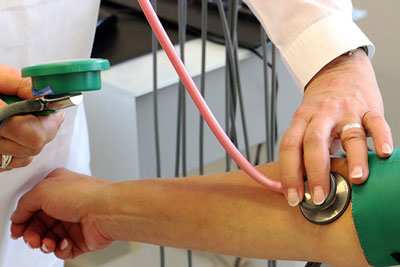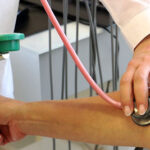 There is much conflicting information on salt in the cause or progression of high blood pressure. I often hear of people being on low sodium diets and do not see it being effective. They usually are also on several high blood pressure medications. Obviously, there is a missing link, and the cause is not being treated. According to the CDC only about 1 in 4 adults (24%) with hypertension have their condition under control.
There is much conflicting information on salt in the cause or progression of high blood pressure. I often hear of people being on low sodium diets and do not see it being effective. They usually are also on several high blood pressure medications. Obviously, there is a missing link, and the cause is not being treated. According to the CDC only about 1 in 4 adults (24%) with hypertension have their condition under control.
Blood pressure is the pressure of blood pushing against the walls of your arteries. If the arteries are stiff and brittle due to lack of omega-3s the vessels are likely to burst due to pressure on them and cause a hemorrhagic stroke. If vessels are flexible, they can absorb the pressure preventing them from bursting. Therefore, we typically prescribe omega 3s in the form of cod liver oil.
Sodium alone does not raise blood pressure as was commonly thought, chloride also plays a key role and may have a stronger effect on increased blood pressure. Sodium is a needed and important electrolyte for many functions in the body such as nerve conduction, relaxation, and contraction of muscles. It is essential to maintain a proper balance of water and minerals for organs to function well—such as heart and brain. Low potassium also plays a key role in hypertension. All the minerals sodium, chloride, potassium, and magnesium need to be considered when treating hypertension.
There can be many reasons for high blood pressure such as caffeine, stress, alcohol, chronic renal disease, smoking, obesity, all of which cause an electrolyte or mineral imbalance. Some minerals are depleted while others are in excess. I also find that dehydration and inflammation cause hypertension in some people which is diet and lifestyle related.
Regulation of sodium in the body depends on both intake which is dietary and loss which is kidney and urination. Most processed foods have excessive amounts of sodium chloride (NaCl) and decreased potassium while most fruits and vegetables have increased potassium and magnesium in the diet.
Exercise, deep breathing, yoga, and massage are all helpful to decrease hypertension caused by stress. Reducing excessive weight and avoidance of caffeine, alcohol and smoking are essential to reducing blood pressure.
For those patients with moderate hypertension, it can be lowered and kept under control with diet and lifestyle changes. Hypertension medications sales are well over $10 billion per year. Many risk factors come with taking high blood pressure medications. Much evidence exists showing high blood pressure medication may be causing more harm than good. Long term studies have shown that diuretics and/or beta blocker users have increased heart disease.
Optimal daily levels of sodium are 400mg/day—most Americans ingest 10-20 times that. Uncontrolled hypertension can lead to heart disease and stroke.
Natural medicine is ideal for those who have moderate hypertension which can be controlled with supplements and lifestyle changes.
